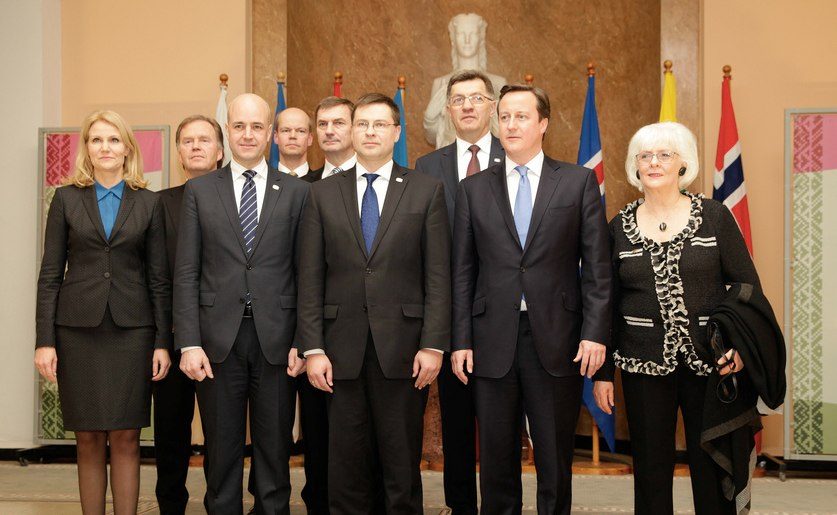I was honored to be invited as one of the experts on the Northern Future Forum 2013. The following is a draft of my presentation, directed straight at the leaders in the image above.
Thank you Andrejs, for that excellent introduction. Let me add that I am not here to sell anything. I’m here as as a passionate citiizen, not as a stakeholder with an agenda to have anyone buy anything. On the contrary, I want you to spend less and still do more…
E-Gov should be understood as Efficient, Economical and Evolving Governance.
One major problem in the current discussions of e-government is the focus on specific and dedicated ICT solutions. The obsession with techology as such. Surely those systems are needed, a modern administration must be digitized on many levels – but the focus should rather be on all what can be achieved by means of already commonly used technology. E-gov should be about leveraging the possibilities at hand, not constructing an endless array of new and expensive initiatives. It’s time for a reality check.
The key foundations of E-gov should be the following four human trends and changing attitudes:
Towards zero friction. This is Iris. She is 11 months old. As you could see in the beging, she’s not even able to stand up straight yet, but she handles the device effortlessly. The device is better designed than her own body. But what really made this possible is that no one has told her thats it’s supposed to be difficult. More than 50% of our swedish three year olds are active internet users. as is 40% of our two year olds – but we also see impressive progress in the older groups, some 35% aged 75 and over are active online…
The borders between online and offline are rapidly declining. With all respect to the digital chasm and the diffusion of innovation: the notion of zero friction gives our society a whole new set of challenges and possibilities.
The social networks. I know of this women, age 70, who changed her doctor – her old one didn’t want to communicate with her on Facebook. And we are familiar with the Arab spring. We have all seen the power of digital make it possible for us to be social beings to the fullest. And we see the outcome of people talking to each other. It’s not specifically about Facebook or Twitter, it’s about the enabling force that comes from connecting more than 2 billion people around the world. In pairs, or in masses.
The one machine, in every window. This is Jack Andraka, a 15 year old US boy who developed a totally new way to detect pancreatic cancer. It’s 168 times faster, 400 times more sensitive, 26000 times cheaper. And he did it by using Google (when chlling out in class). We are, collaboratively, building this massive ”machine” of information and communication. With every screen constantly connected to it we are basically ”the all knowing man” again, not seen since the ages of Aristotle.
To get there spells together. And on the case of collaboration. Eleven years ago no one would have believed Wikipedia to be possible. The wisdom of crowds was basically just a theory. But now we see it, and it’s amazing power, in practice. Collaboration and participating are coming back into the core of our society again, enabled by global technology.
These four cornerstones are the building blocks for a modern government, utilizing the common powers of todays society. It also forces, in a good way, our state to be listening, transparent, progressive and efficient.
Based on these cornerstones I see open research, open education, open communication and open data (to name only a few key possibilities) make a real change for the better – basically covering all the sub-themes of ”Addressing the digital divide”.
But I also see a couple of things that should be done now!
Access to internet Everywhere, all the time, as fast as possible – with as low friction as possible… fx: why did we have to login to the wifi in this venue?
And with full respect for the fact that the unregulated nature of internet is what made it a win. Let’s keep the internet free and open for everyone, regardless of the wishes of the hollywood mob…
Access to technology Devices are cheap today, still they are not accessible to everyone. Let’s not focus solely on schools, everyone should have a window to the one machine. That’s how we get the mindset in place, and how we overcome the digital divide.
Access to common resources Open data will have a dedicated presentation soon. I can’t stress enough the importance of modern access to public sector information. For the sake of evolving business AND safeguarding democracy in our time of traditional media failing – just DO this now!
Access to the world We already have frameworks in place for all of us to be better suited for the learning society. EU has done some excellent work with listing the key competences, where for instance language is in focus. To be able to take benefit from a global world of communication we need to be able to communicate with each other…
To conclude, our governing forces need to engage more in everyday tech – the four foundations – to realize the possibilities and take appropriate action. Don’t let ICT staff dictate the policies. Don’t let big corporations sell you expensive stuff that you don’t need. Don’t do complicated when you can do simple.
To again refer to Aristotle; what we have to learn to do – we learn by doing.
You CAN understand these issues – I promise. Maybe not quite as well as 11 month old baby Iris – but close enough to act in an informed way.
(video will be posted later)


2 thoughts on “E-Gov should be understood as Efficient, Economical and Evolving Governance.”